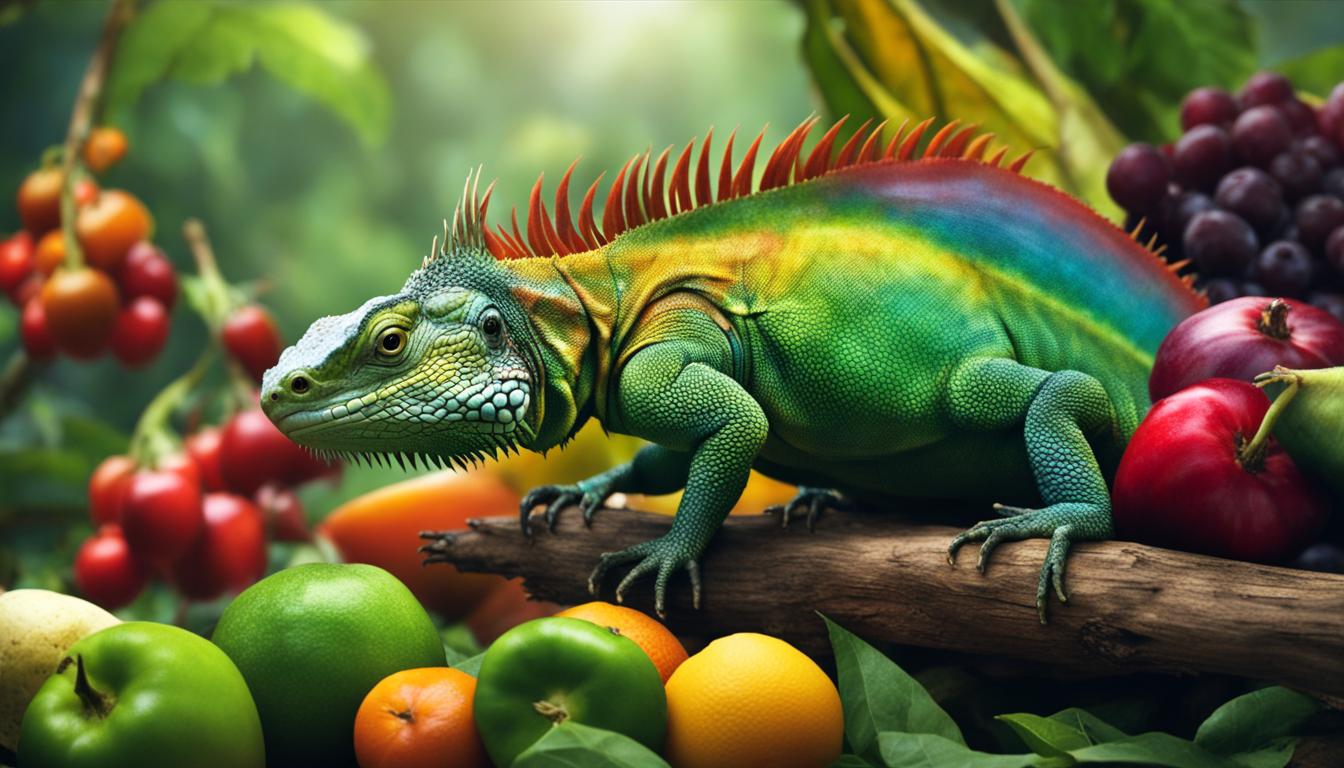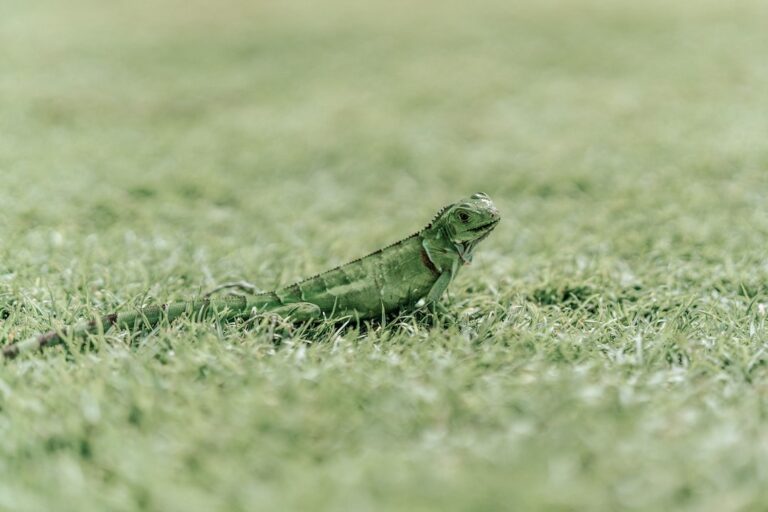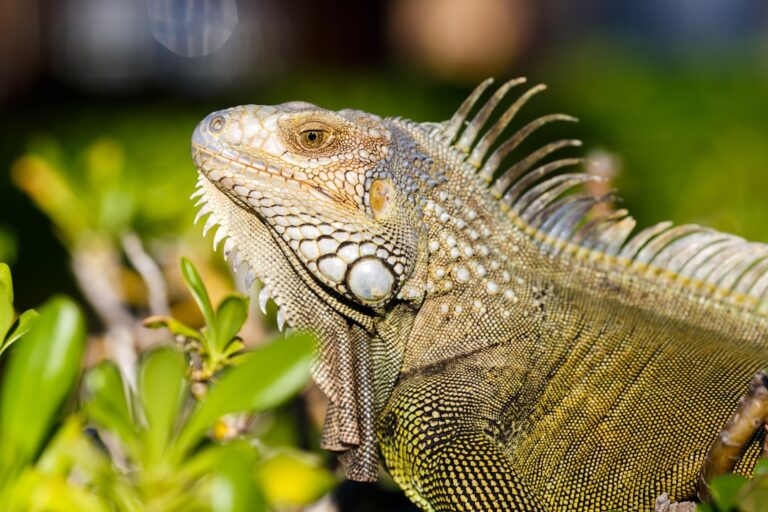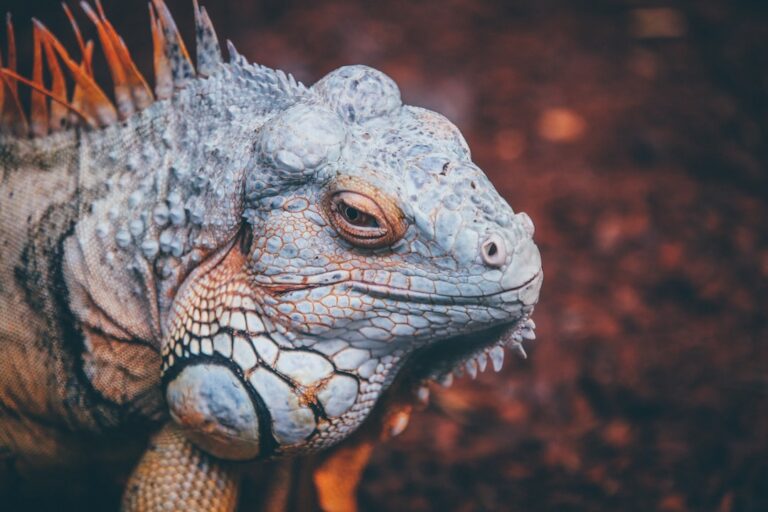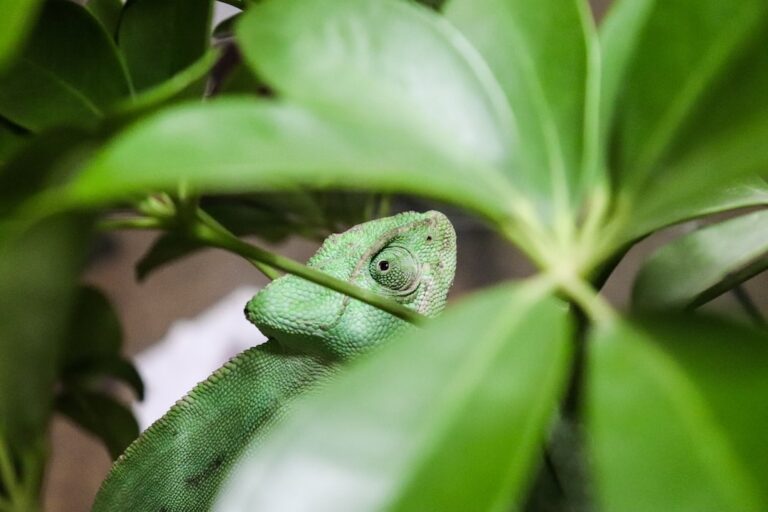Do Iguanas Eat Meat? Exploring the Iguana Diet
Welcome to our in-depth exploration of the iguana diet! If you’re wondering whether iguanas eat meat, you’re in the right place. Let’s dive into the fascinating world of these herbivorous reptiles and unravel the mysteries of their dietary preferences.
Iguanas are primarily herbivores, meaning their diet consists primarily of plant matter. In the wild, they feast on leaves, fruits, and flowers, relying on a variety of vegetation to meet their nutritional needs. However, there are some considerations when it comes to feeding these beloved pets.
Table of Contents
Key Takeaways:
- Iguanas are herbivores, primarily consuming leaves, fruits, and flowers in the wild.
- A calcium-rich and diverse diet is essential for their overall health and well-being.
- Animal-based protein should make up only a small portion of their diet, less than 5%.
- Dark green leafy vegetables should constitute the majority of their diet, with fruits offered sparingly.
- Consult with a veterinarian for specific dietary recommendations and potential supplements.
Understanding the Iguana’s Natural Diet
When it comes to the diet of iguanas, it is important to understand their natural feeding habits. In the wild, iguanas primarily consume leaves, fruits, and flowers. Tree leaves and vines are their main source of food, with fruits and flowers serving as occasional treats. It is vital to replicate this herbivorous diet in captivity to ensure the health and well-being of pet iguanas.
To mimic their natural diet, it is recommended to provide a variety of dark green leafy vegetables as the main component of an iguana’s meals. These vegetables should make up a significant portion of their diet, offering essential nutrients and fiber. Examples of suitable dark green leafy vegetables include collard greens, mustard greens, kale, and beet greens. These vegetables are rich in calcium and other vital minerals.
In addition to leafy greens, iguanas can also benefit from the consumption of other vegetables and fruits. Broccoli, squash, bell peppers, and green beans are excellent options to include in their diet. However, it is essential to avoid nutrient-deficient vegetables like iceberg lettuce and celery.
Table: Recommended Vegetables for an Iguana’s Diet
| Vegetables | Percentage of Diet |
|---|---|
| Dark green leafy vegetables (collard greens, mustard greens, kale, beet greens) | 40-50% |
| Other vegetables (broccoli, squash, bell peppers, green beans) | 30-40% |
Fruits should be offered sparingly as they are high in water content and low in nutritional value compared to vegetables. It is important to limit fruit intake to less than 20% of an iguana’s overall diet. Suitable options include apples, pears, bananas, mangoes, grapes, and melons. Edible flowers can also be a delightful treat for iguanas.
Recommended Plant Material for Iguanas
Iguanas have specific dietary needs, and providing them with a variety of plant-based foods is essential for their health and well-being. While dark green leafy vegetables should make up the majority of an adult iguana’s diet, there are other plant materials that can provide important nutrients. Here is a breakdown of recommended plant material for iguanas:
Dark Green Leafy Vegetables:
These vegetables should make up around 40-50% of an adult iguana’s diet. They are rich in essential vitamins, minerals, and fiber. Some examples of dark green leafy vegetables suitable for iguanas include:
- Collard greens
- Beet greens
- Mustard greens
- Kale
Other Vegetables:
In addition to dark green leafy vegetables, iguanas can also benefit from a variety of other vegetables. These should make up around 30-40% of their diet. Some suitable options include:
- Broccoli
- Squash
- Bell peppers
- Green beans
Calcium-Rich Vegetables:
Calcium is an important mineral for iguanas, and incorporating calcium-rich vegetables into their diet can help prevent calcium deficiencies. These vegetables should make up a smaller percentage of their overall diet. Some examples of calcium-rich vegetables for iguanas are:
- Bok choy
- Parsley
- Swiss chard
- Dandelion greens
Remember to provide a varied diet for your iguana to ensure they receive a wide range of nutrients. It’s important to consult with a veterinarian to determine the specific dietary needs of your iguana and to address any concerns or questions you may have.
Potential Risks of Certain Vegetables in an Iguana’s Diet
Iguanas have specific dietary requirements, and while certain vegetables are generally considered safe and nutritious for them, there are some potential risks associated with certain vegetables that need to be considered. Two common concerns when it comes to an iguana’s diet are oxalates and goitrogens.
Oxalates: Some vegetables, such as Swiss chard, spinach, and beet greens, are rich in calcium, which is beneficial for iguanas. However, these vegetables also contain oxalates, which can bind to calcium and prevent its absorption. This can lead to calcium deficiency in iguanas over time. It’s important to include a variety of calcium-rich vegetables in an iguana’s diet, but it is equally important not to rely exclusively on oxalate-rich vegetables.
Goitrogens: Vegetables like cabbage, kale, and mustard greens contain compounds called goitrogens. These compounds can interfere with the thyroid function in iguanas and may lead to the development of goiter. While these vegetables can still be included in an iguana’s diet, they should be fed in small amounts and not make up a significant portion of their overall food intake.
It’s important to note that the risks associated with oxalates and goitrogens can be minimized by offering a varied and balanced diet to your iguana. By including a diverse range of vegetables and rotating their diet, you can ensure that your iguana receives a good balance of nutrients without relying heavily on vegetables that may carry potential risks.
“It’s important to include a variety of calcium-rich vegetables in an iguana’s diet, but it is equally important not to rely exclusively on oxalate-rich vegetables.”
Consulting with a reptile veterinarian can also provide valuable guidance in creating a diet plan that meets your iguana’s specific nutritional needs while minimizing potential risks. The veterinarian can help assess the overall health of your iguana and provide specific recommendations based on their age, size, and any pre-existing health conditions.
| Vegetable | Risk |
|---|---|
| Swiss Chard | High in oxalates, which can prevent calcium absorption |
| Spinach | High in oxalates, which can prevent calcium absorption |
| Beet Greens | High in oxalates, which can prevent calcium absorption |
| Cabbage | Contains goitrogens, which can interfere with thyroid function |
| Kale | Contains goitrogens, which can interfere with thyroid function |
| Mustard Greens | Contains goitrogens, which can interfere with thyroid function |
Note: The table provides a list of vegetables that may carry potential risks due to their high oxalate or goitrogen content. These vegetables can still be included in an iguana’s diet, but should be offered in moderation and as part of a varied and balanced diet.
Suitable Fruits for Iguanas
While iguanas are primarily herbivores, incorporating a small amount of fruits into their diet can provide variety and additional nutrients. It is important to remember that fruits should make up less than 20% of an iguana’s total diet to prevent nutritional imbalances.
Some suitable fruits for iguanas include:
- Apples: High in fiber and vitamin C, apples can be offered in small pieces as a healthy treat.
- Pears: Another fiber-rich option, pears can be a refreshing addition to an iguana’s diet.
- Bananas: A good source of potassium and vitamin B6, bananas can be offered occasionally, but in moderation due to their high sugar content.
- Mangoes: Rich in vitamin A and vitamin C, mangoes can be a tasty and nutritious treat for iguanas.
- Grapes: A source of antioxidants, grapes can be given sparingly as a small and flavorful snack.
- Melons: Watermelons and cantaloupes are hydrating options that can be offered occasionally.
Additionally, edible flowers such as hibiscus and nasturtium can be provided as an occasional treat. These flowers not only add visual appeal but also offer some nutritional value to an iguana’s diet.
Table: Nutrition Content of Common Fruits for Iguanas
| Fruit | Nutrients |
|---|---|
| Apple | Fiber, Vitamin C |
| Pear | Fiber, Vitamin C |
| Banana | Potassium, Vitamin B6 |
| Mango | Vitamin A, Vitamin C |
| Grape | Antioxidants |
| Melon | Hydration |
It is important to note that while fruits can be a valuable addition to an iguana’s diet, they should not be the main focus. Dark green leafy vegetables and other plant material should still comprise the majority of their meals to ensure they receive the necessary nutrients for their overall health and well-being.
Feeding Frequency for Iguanas
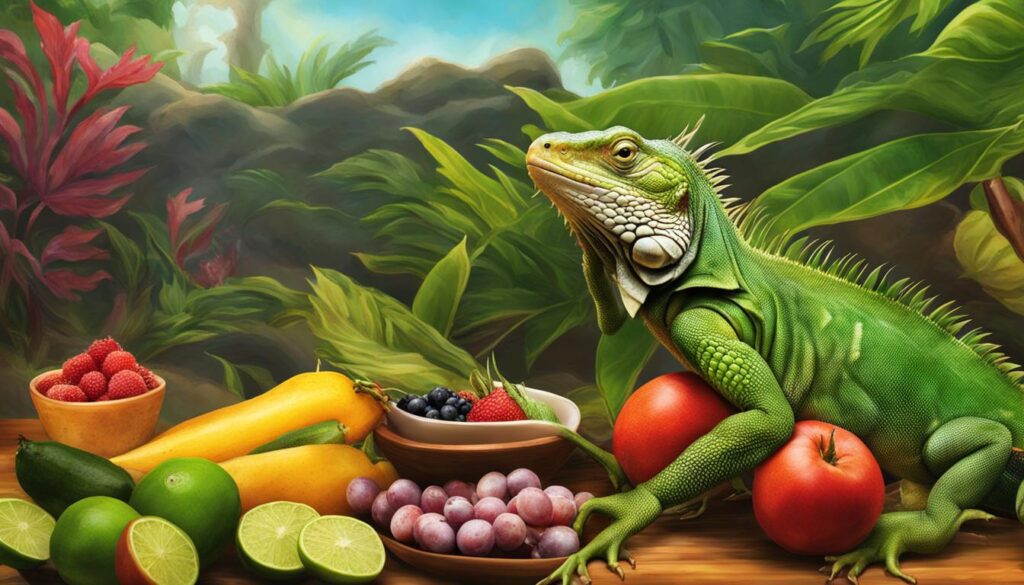
Iguanas have unique dietary needs that require careful attention to their feeding frequency. The frequency of feeding depends on the age and health of the iguana. Understanding the appropriate feeding schedule is essential to ensure their overall well-being.
Feeding Schedule for Young Iguanas:
Young iguanas, especially those in the growth phase, should be fed daily. Their bodies require a consistent supply of nutrients for proper development. It is important to offer a variety of foods to ensure a well-rounded diet. Feeding young iguanas multiple times a day in smaller portions can also help prevent overeating.
Feeding Schedule for Adult Iguanas:
Adult iguanas have slower metabolisms and do not require as frequent feedings as their younger counterparts. They can be fed daily but can also be fed every other day if they are overweight. It is crucial to monitor an adult iguana’s weight and adjust the feeding schedule accordingly. Observing their feeding behavior can provide valuable insights into their nutritional needs.
| Age | Feeding Frequency |
|---|---|
| Youth (under 1 year old) | Daily, multiple times a day |
| Adult (1 year and older) | Daily or every other day (if overweight) |
It is important to note that each individual iguana’s feeding requirements may vary. Some iguanas may have specific dietary needs or health conditions that require a different feeding schedule. Consulting with a veterinarian experienced in reptile care can provide personalized guidance for optimal feeding frequency.
Vitamin and Mineral Supplements for Iguanas
Iguanas, like all animals, require a balanced diet to thrive. While their primary source of nutrition should come from dark green leafy vegetables and other plant materials, there are instances where additional supplementation is necessary to provide essential vitamins and minerals. Here, we will explore the role of supplements in an iguana’s diet and provide recommendations for their use.
Calcium Supplements:
Calcium is a vital mineral for iguanas, as it plays a crucial role in bone development and overall health. To ensure adequate calcium intake, most veterinarians recommend lightly sprinkling a growing iguana’s food every other day with calcium powder. This helps prevent calcium deficiencies and the development of metabolic bone disease. Adult iguanas may require calcium supplements once or twice a week to maintain their calcium levels. It’s important to note that the calcium-to-phosphorus ratio should be balanced, with more calcium than phosphorus. Excessive phosphorus can hinder calcium absorption.
Vitamin D Supplements:
Young iguanas, especially those kept indoors with limited access to natural sunlight, may require vitamin D supplementation. Vitamin D is essential for proper calcium absorption and utilization. It aids in bone development and prevents the development of metabolic bone disease. Consult with a veterinarian for specific recommendations on vitamin D supplementation based on your iguana’s needs and exposure to UV light.
It’s important to note that supplements should be used as a complement to a well-rounded, balanced diet. They should not be relied upon as a sole source of nutrition. Proper nutrition should always be the primary focus, with supplements serving as a means to address specific deficiencies or meet increased demands, such as during growth stages.
“Supplements should be used as a complement to a well-rounded, balanced diet.”
Regular veterinary check-ups are crucial to assess your iguana’s overall health and address any specific dietary needs. A veterinarian can provide personalized recommendations on supplement dosage and frequency based on your iguana’s age, size, and health status. Remember, every iguana is unique, and it’s essential to tailor their diet and supplement regimen to their individual needs.
Providing Water for Iguanas
Iguanas, like all living creatures, require access to clean and fresh water for hydration. Water plays a vital role in their overall health and well-being. It is important to ensure that water is readily available at all times, in a form that is accessible for the iguanas to drink and bathe in.
The Importance of Water for Iguanas
Iguanas drink water to meet their hydration needs, but they also absorb water through their skin when they bask or bathe in it. Maintaining proper hydration is crucial for their digestion, organ function, and overall health. Water also helps regulate their body temperature and aids in shedding their skin.
“Water is essential for iguanas as it ensures proper hydration and helps support their bodily functions. Access to clean water throughout the day is crucial for their overall well-being.”
Along with drinking, iguanas also enjoy bathing in water. Misting them a few times a week helps them absorb moisture through their skin, which is particularly important during dry periods or when the humidity in their environment is low.
Water Bowl and Changing Routine
To provide water for your iguana, it is recommended to place a heavy water bowl in their enclosure. This will prevent accidental tipping and spilling. The water should be changed daily to ensure cleanliness and prevent the growth of bacteria or algae. Regular cleaning and disinfection of the water bowl are also necessary to maintain a healthy water source for your iguana.
Additionally, it is important to monitor the water intake of your iguana. If you notice a significant decrease in water consumption or any signs of dehydration, it is crucial to consult with a veterinarian to rule out any underlying health issues.
Summary
Providing clean and accessible water for iguanas is essential for their well-being. They rely on both drinking and absorbing water through their skin to stay hydrated. Regular access to fresh water helps support their bodily functions and overall health. By ensuring they have a heavy water bowl, regularly changing the water, and misting them for additional moisture, you can help keep your iguana properly hydrated.
Potential Health Issues Related to Improper Diet
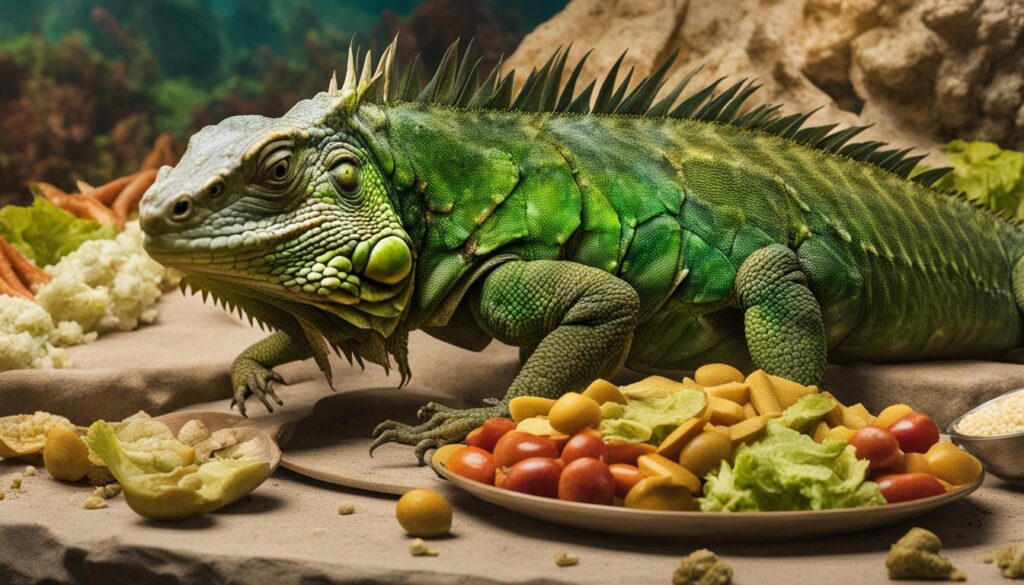
An improper diet can have serious consequences for the health of iguanas. Nutritional deficiencies can arise, leading to various health problems that can significantly impact their well-being. It is essential for iguana owners to understand the potential risks associated with an inadequate diet and take appropriate measures to ensure their pets receive a balanced and nutritious diet.
Nutritional deficiencies in iguanas can manifest in several ways. One common health issue is metabolic bone disease, which occurs when there is an imbalance between calcium and phosphorus in the diet. Insufficient calcium intake can lead to weak bones, fractures, and deformities. In severe cases, it can even impair the functioning of the heart and other organs.
Organ damage is another potential consequence of an improper diet. If iguanas do not receive adequate nutrients, their organs may not function properly, leading to issues such as liver and kidney damage. These organs play crucial roles in the iguana’s overall health and should not be compromised due to dietary neglect.
To avoid these health problems, it is crucial to provide iguanas with a diet that meets their specific nutritional requirements. Consulting with a veterinarian specializing in reptiles can help ensure their dietary needs are met. Regular check-ups and blood work can also help identify any nutritional deficiencies or health issues early on, allowing for timely interventions and proper care.
Nutritional Deficiencies in Iguanas
Here are some common nutritional deficiencies in iguanas and the symptoms associated with them:
- Vitamin A deficiency: Symptoms include swelling and discharge from the eyes, skin infections, and poor appetite.
- Vitamin D deficiency: Signs include softening of the bones, muscle weakness, and tremors.
- Calcium deficiency: This can lead to metabolic bone disease, causing weak bones and fractures.
- Protein deficiency: A lack of protein can result in stunted growth, weak muscles, and a compromised immune system.
It is important to note that these deficiencies can be prevented by providing a balanced and varied diet that includes appropriate amounts of vitamins, minerals, and macronutrients. Commercially available iguana diets can be used as supplements, but they should not be the main source of nutrition.
By understanding the potential health issues related to an improper diet and taking proactive steps to provide a balanced and varied diet, iguana owners can help ensure their pets live long, healthy lives. Proper nutrition is a crucial aspect of responsible pet ownership and should not be overlooked.
Risks of Feeding Meat to Iguanas
Feeding meat to iguanas can pose several risks to their health. While iguanas are primarily herbivores, some owners may mistakenly believe that adding animal-based protein to their diet is beneficial. However, excessive consumption of meat can strain their liver and kidneys, leading to potential health complications.
It is important to note that animal-based protein should make up less than 5% of an adult iguana’s diet and up to 10% for young, growing iguanas. Overfeeding meat can result in imbalances in their nutritional intake, potentially leading to obesity, digestive problems, and even liver disease. It is crucial to prioritize a diet that mimics their natural herbivorous eating habits.
Furthermore, it is not recommended to regularly feed iguanas with dog or cat food. These commercial pet foods are formulated with high levels of protein, vitamin D, and fat, which can be detrimental to an iguana’s overall health and well-being.
Risks of Feeding Meat to Iguanas
“Excessive consumption of meat can strain their liver and kidneys, leading to potential health complications.”
| Severity | Risks |
|---|---|
| High | Liver and kidney strain |
| Moderate | Nutritional imbalances |
| Low | Obesity, digestive problems |
| Low | Liver disease |
A balanced and appropriate diet is crucial for the overall health and longevity of iguanas. Consulting with a veterinarian who specializes in reptiles is highly recommended to ensure that your iguana’s specific dietary needs are met. They can provide guidance on how to maintain a proper herbivorous diet, minimizing the risks associated with feeding meat and animal-based protein to these fascinating reptiles.
Risks and Benefits of Treating Iguana’s Diet with Supplements
Supplementing an iguana’s diet with appropriate supplements can have both risks and benefits. One common supplement is calcium, which is important for the development and maintenance of strong bones in iguanas. Calcium supplementation is generally recommended, especially for growing iguanas. However, it is essential to provide calcium in moderation to prevent excessive intake, which can lead to health issues.
Vitamin D is another important supplement for iguanas, as it aids in calcium absorption and helps prevent metabolic bone disease. Young iguanas with limited access to UV light may benefit from vitamin D supplements. However, it is crucial to follow recommended dosage guidelines and consult with a veterinarian for individualized advice.
While supplements can be beneficial, they should not replace a balanced diet. It is important to provide iguanas with a variety of dark green leafy vegetables, fruits, and other vegetables as their primary food source. Supplements should be used as a complement to a proper diet, not as a substitute. Regular veterinary check-ups and consultations are recommended to ensure that the iguana’s specific dietary needs are met.
Table: Risks and Benefits of Iguana Diet Supplements
| Supplement | Risks | Benefits |
|---|---|---|
| Calcium | Excessive intake can cause health issues | Essential for bone development and maintenance |
| Vitamin D | Overdose can be harmful | Aids in calcium absorption and prevents metabolic bone disease |
Supplements should always be used under the guidance of a veterinarian who can assess the iguana’s specific needs. It is important to monitor the iguana’s overall health and adjust the supplementation accordingly. By providing a balanced diet along with appropriate supplementation, iguana owners can help ensure the long-term health and well-being of their beloved pets.
Conclusion
In conclusion, maintaining a proper diet is essential for the health and well-being of iguanas. These reptiles are primarily herbivores that thrive on a diet consisting of dark green leafy vegetables, supplemented with fruits and other vegetables. Animal-based protein should only make up a small portion of their overall diet, with a limit of less than 5% for adult iguanas. It is crucial to provide iguanas with access to fresh, clean water at all times to ensure proper hydration.
Additionally, vitamin and mineral supplementation may be necessary to meet their specific nutritional needs. Calcium supplements are often recommended to support healthy bone development, but it is important to use them in moderation to prevent excessive intake. Regular check-ups with a veterinarian are highly advised to monitor the iguana’s dietary requirements and address any potential health issues.
In summary, a well-balanced diet, consisting of a variety of dark green leafy vegetables, supplemented with fruits and other vegetables, is key to maintaining the health of your pet iguana. Providing them with clean water, monitoring their protein intake, and considering appropriate supplementation will help ensure they thrive in captivity. By following these guidelines and seeking professional advice, you can offer your iguana a nutritious and fulfilling diet.
FAQ
Do iguanas eat meat?
No, iguanas are primarily herbivores and their diet consists mainly of plants. While they may consume small amounts of animal-based protein in the wild, it should make up less than 5% of their total diet in captivity.
What do iguanas eat in the wild?
In the wild, iguanas feed on leaves, fruits, and flowers. Their diet consists mostly of dark green leafy vegetables, with some fruits and other vegetables.
What are the recommended plant materials for iguanas?
Dark green leafy vegetables like collard greens, beet greens, mustard greens, and kale are recommended for iguanas. Calcium-rich vegetables such as bok choy, parsley, Swiss chard, and dandelion are also beneficial.
Are there any risks associated with certain vegetables in an iguana’s diet?
Yes, vegetables like Swiss chard, spinach, and beet greens contain oxalates that can prevent calcium absorption. Cabbage, kale, and mustard greens should only be fed in small amounts due to the presence of goitrogens, which can lead to goiter in iguanas.
What fruits are suitable for iguanas?
Apples, pears, bananas, mangoes, grapes, and melons are suitable options for iguanas. Fruits should only make up a small percentage of their diet.
How often should I feed my iguana?
Young iguanas should be fed daily, while adult iguanas can be fed daily or every other day if they are overweight. It is best to observe their feeding behavior and adjust the amount of food accordingly.
Should I provide supplements to my iguana?
Calcium supplements are generally recommended for iguanas, especially growing ones. Multivitamin supplements containing vitamin D can also be beneficial for young iguanas with limited UV light exposure. Consult with a veterinarian for individualized recommendations.
How do I provide water for my iguana?
Fresh clean water should be available at all times for iguanas. They will drink from a water bowl and also bathe in it to absorb water through their skin. Water bowls should be heavy and changed daily to prevent contamination.
What are the potential health issues related to an improper diet?
An improper diet can lead to various health problems in iguanas, including metabolic bone disease, organ damage, and nutrient deficiencies. It is important to provide a balanced diet to ensure their overall health and well-being.
Can iguanas eat meat or animal-based protein?
While some veterinarians suggest supplementing the diet of iguanas with small amounts of animal-based protein, it should make up less than 5% of their total diet for adult iguanas. Dog and cat food should not be fed regularly as they contain high levels of protein, vitamin D, and fat.
What are the risks and benefits of treating an iguana’s diet with supplements?
The use of supplements for iguanas is controversial, and specific recommendations may vary. While calcium supplementation is generally recommended, it should be done in moderation to avoid excessive intake. Consult with a veterinarian for individualized recommendations.
What is the conclusion of the iguana diet?
Proper nutrition is crucial for the health and well-being of iguanas. Their diet should consist primarily of dark green leafy vegetables, with fruits and other vegetables offered in moderation. Animal-based protein should be limited to a small percentage of their total diet. Adequate water and supplementation, if necessary, are important for their overall health.

